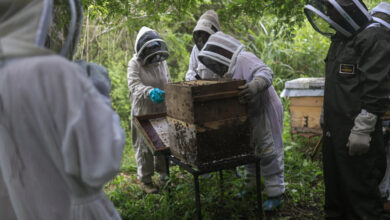Myths and Realities: The Lifestyle of Vegetarianism
Learn about the beliefs that have formed after the apex of the veggie movement.

The Woman Post | María Carolina Rivero
Listen to this article
This lifestyle and animal welfare have evolved through vegetarians. However, they are still a fairly small percentage compared to omnivores. That is why The Woman Post invites you to know the myths and realities of this different world.
A study called "The Green Revolution: Understanding the Vegetarian Boom" by Latern reveals that the center of their diet is located in the plant kingdom. The data collected show that vegans are 0.2% of the population, vegetarians 1.3%, and flexitarians 6.3%, that is, a total of 7.8% maintain vegetarian diets. In addition, they publish that 1 in 10 women is veggie and account for a little more than two-thirds of that population.
On the other hand, the results suggest that their main reasons for adopting this diet are sustainability, health, and respect for animals. These options emphasize products that contain protein but are a plant-based alternative. Among them are spirulina algae with 58 grams, textured soy with 47 grams, hemp seeds with 32 grams, and lentils with 24 grams. They also reveal other products such as seitan, toasted almonds, quinoa, and tofu that have large amounts of protein.
Myths of Vegetarianism
1. You lose intellectual abilities: According to the report of "Food for a Healthy Brain" made by Pablo Richly and published by the INECO Memory Clinic. It reveals that the brain consumes 20% of the energy expended by the body. The data collected shows that eating a healthy diet, performing physical activities, and reducing stress are all part of maintaining a healthy brain.
2. It only feeds on fruits and vegetables: This premise is not so true, because several groups of vegetarians or vegans eat food according to their beliefs.
-Vegetarian API: They only eat plant-based foods, even honey is part of their diet.
-Ovo vegetarian and Lacto vegetarian: They consume foods of vegetable origin, in addition to eggs and milk respectively.
-Strict vegetarians: They do not eat foods of animal origin, even extending to products such as shoes, clothing, cosmetics, among others.
Also read: ARE YOU LIVING YOUR TRUE PURPOSE?
3. It is responsible for deforestation and pollution: A report called "Global Forest Resources Assessment 2020" by the Food and Agriculture Organization of the United Nations (FAO) reveals that the area of forest decreases by 7.8 million hectares. The data collected show that the annual rate of deforestation is estimated to be 10 million hectares. On the other hand, the data suggest that 420 million hectares of forest have been lost as a result of deforestation and more than 90% took place in the tropical zone.
Regarding pollution, an article called "Greenhouse gas emissions in the diet of meat, fish, vegetarian and vegan consumers in the UK" by Peter Scarborough was published in Springer Link Magazine in 2014. It reveals that the production of food of animal origin is associated with higher gas emissions concerning foods of plant origin. The data collected were 7.19 for high meat consumers, 5.63 for medium meat consumers, and 4.67 for low meat consumers. By contrast, for vegetarians emissions were at 3.81 and vegans at 2.89. That is why the production, transport, storage, cooking, and waste of food contribute to greenhouse gas emissions.
Realities of Vegetarianism
-Does not provide enough protein: Some foods of plant origin are rich in protein; however, they are not enough for our body. That is why they need vitamin supplements to stay in shape.
-Require vitamin supplements: Indeed, vegetarians require some vitamin supplements to maintain their nutrition. Among them are Omega 3, antioxidants, iron, vitamin E, phytochemicals and polyphenols, and vitamin B12.
-The vegetarian diet produces anemia: Anemia is mainly caused by a lack of iron and vitamin B12. That is why, in our diet should be the presence of legumes, such as soy, chickpeas, and lentils; green leafy vegetables such as spinach, chard, cabbage, artichokes, broccoli, and cauliflower; including nuts.
What Drives the Vegetarian To Follow This Lifestyle?
-Ecology and sustainability.
-Behavior.
-Religion.
-Health and wellness.
In short, trying a healthy lifestyle with new recipes and products would be able to generate fewer gas emissions. This action would cause a great benefit for our planet and much more if everyone collaborates.
We invite you to participate in this lifestyle!




